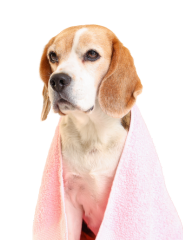ABOUT Beagle
Beagles, an ancient breed from England, were developed as scent hounds for tracking small game like rabbits due to their exceptional sense of smell. They have around 220 million scent receptors, making them highly effective for roles in tracking and detection. Known for their stubborn, independent nature, Beagles can be difficult to train, especially when distracted by scents. Partial deafness can occur, though it’s not common. Their strong olfactory abilities and determination are key traits of the breed.

Male
Ideal height: 55-62cm Ideal height: 29 - 36kg

Female
Ideal height: 54 - 60cm Ideal weight: 25 - 32kg

Size
Medium
Life Span
10 – 12 Years
Coat
Color
Medium
Traits & Characteristics
80%
80%
40%
100%
80%

Heat Tolerance
upto 27° C

Cold Tolerance
Upto -6° C

Best Diet for Beagle


Carbohydrates
30 – 50%
Protein
20 – 30%
Fats
8 – 16%
Essentials, Vitamins & Minerals
6 – 8%
Fiber
2 – 4%
Total Kcal
1,000 – 1,500
Must have meal for a Beagle
Beagles need a balanced diet with high-quality protein, whole grains, fruits, and vegetables. Healthy fats support skin and coat health. Puppies should eat 3-4 times a day, while adults can have 2 meals.
What to avoid?
Most commercial dog food contains fillers like grains and soy which can be difficult for them to digest and may cause allergies. Choose dog food that is made with whole, natural ingredients and free from unnecessary additives.
🐾 Try Our Beagle Fresh Food!
Wholesome, freshly cooked meals crafted to match your Beagle’s active lifestyle and sensitive tummy. Balanced nutrition helps maintain a healthy weight, supports strong immunity, and keeps your Beagle full of energy and joy.

Book a Beagle Diet Consultation
Get personalized diet advice designed for your Beagle’s unique needs. Our experts will guide you on portion control, weight management, and healthy treats—absolutely FREE!

Beagle Diet
Opting for fresh meals ensures your Beagle gets natural, nutrient-rich food that supports steady growth, strong bones, a shiny coat, and overall immunity. Beagles are known for their big appetite and tendency to overeat, so portion control is very important to prevent obesity. Balanced, freshly cooked meals are easier to digest than dry kibble and help your Beagle stay energetic, playful, and healthy every day.

Protein Based Diet
Beagles thrive on a protein-rich, fresh diet that supports their active lifestyle, keeps muscles lean, coat glossy, and digestion smooth. Vegetables like carrots, pumpkin, sweet potato, beans, and spinach provide fiber and vitamins, while chicken, fish, eggs, and paneer supply high-quality protein and omega-3s for joint and coat health.
Simple meals like chicken with rice and veggies, or paneer with quinoa and spinach, are ideal for Beagles’ moderate energy needs. Adding a little fish oil or olive oil boosts skin and joint health.
❌ Avoid harmful foods: onions, garlic, grapes, raisins, avocado, chocolate, excess salt, and oily/fried foods.
WEIGHT, STRENGTH AND GUT CONSIDERATE DIET
Beagles are prone to weight gain because of their immense love for food, so a balanced, portion-controlled diet is very important. Fiber-rich foods like oats, sweet potatoes, and green beans support digestion, while lean proteins such as chicken, lamb, and fish keep muscles strong without adding excess calories.
Adding probiotics from fermented foods helps maintain gut balance, while omega-3 fatty acids from fish oil support a healthy coat and reduce inflammation—especially important for their sensitive joints.
Consider Their Age
Just like humans, a Beagle’s diet changes as they grow.
🐾 Puppies (2-12 months): Need protein-rich, calorie-dense meals to support fast growth, strong bones, and immunity.
🐾 Adults (1-7 years): Require balanced diets with lean protein, healthy fats, and controlled calories to fuel energy and maintain muscle.
🐾 Seniors (7+ years): Benefit from lighter, easily digestible protein, more fiber, joint-support nutrients like glucosamine, and antioxidants to slow aging.

Apple
Provide fiber and vitamins; ensure seeds and core are removed.

Carrot
Crunchy and rich in vitamins; supports dental health and is low in calories.

Green Beans
Low in calories and high in fiber, aiding digestion and keeping them full.

Sweet Potato
Nutrient-dense with fiber, helping digestion and providing essential vitamins.

Training Needs for Beagle
Beagles are highly driven by their sense of smell, which can make them both curious and easily distracted. While they are intelligent, their independent and stubborn nature can sometimes make training a challenge if not approached with patience and consistency. Their playful and energetic nature, however, responds well to positive reinforcement.
With consistent training, high-value rewards (like favorite treats), and early socialization, Beagles quickly learn commands. Since they are scent hounds, they thrive on daily exercise that engages their nose, such as scent work, ‘find the treat’ games, or long walks. A mix of mental stimulation and physical activity keeps Beagles happy, healthy, and well-behaved, while also preventing boredom-related mischief.

Puppy Stage (2–6 months)
The first few months are crucial for shaping a well-mannered Beagle. Focus on toilet training, crate habits, and basic obedience commands like sit, stay, and come. Beagles are naturally curious and food-motivated, so positive reinforcement with treats works well. Early socialization with people, children, and other pets is essential to prevent shyness or overexcitement. Redirect chewing during teething and establish consistent routines. Our 8-session foundation plan is ideal at this stage, covering toilet training, home manners, and early obedience.
Suggested Package: 8 Sessions

Adolescent Stage (6–18 months)
Adolescence can be challenging for Beagles, as they are energetic, independent, and scent-driven. Training should emphasize impulse control, leash manners, recall, and reinforcing earlier commands even when distracted by scents. Structured activities like scent games, obedience exercises, and controlled play help channel energy productively. Calm behavior around visitors and new environments should also be encouraged. The 12-session intermediate plan is perfect at this stage, focusing on recall, obedience, and leash walking, while the 16-session complete program further develops advanced obedience, behavioral control, and mental stimulation.
Suggested Package: 12 Sessions

Adult Stage (1.5 years +)
Adult Beagles require continued mental stimulation and consistent training to stay disciplined and focused. Focus on long-distance recall, off-leash control in safe areas, extended stays, and leash walking in busy or distracting environments. Incorporate scent games, puzzle activities, or specialized tasks to satisfy their natural tracking instincts. Reinforce calm behavior and reliability, especially around children or other pets. The 16-session complete program is highly recommended for adult Beagles to create a confident, obedient, and happy companion.
Suggested Package: 16 Sessions

Dog Training: Expert Guidance at Home
Turn your pup into a well-mannered pro—where training meets success

Vet Visits

Puppyhood (0-1 Year):

Every 3-4 weeks until 16 weeks, then every 6-12 months.

Vaccinations, parasite control, neutering, and behavior guidance.
Adulthood (1-6 Years):

Annual check-ups.

Vaccine boosters, dental care, diet, exercising, weight management.

Mature adulthood (7-9 Years):

Annual or bi-annual visits.

Senior screenings, joint health, vision and hearing checks, and diet adjustments.
Senior years (10+ Years):

Bi-annual visits or more.

Comprehensive exams, pain management, cancer screening, quality of life, and senior nutrition.
Vaccination Schedule

First
6-8 week
Second
10-12 week
Third
14-16 week
Regular
Yearly once
Grooming
Beagles require minimal grooming to keep their coat healthy. Their short, dense coat should be brushed weekly to manage shedding and remove loose hair. Bathe them every 4 to 6 weeks, or as needed, to maintain cleanliness. Regular brushing and occasional baths help maintain their appearance and overall hygiene.

Brush & Bath guide
Beagles should be brushed weekly to manage shedding and keep their coat smooth. They typically need a bath every 4 to 6 weeks, or as needed, to maintain cleanliness and remove odors. Regular brushing and occasional bathing help keep their coat healthy and reduce shedding.

Ear Cleaning
Beagles should have their ears checked and cleaned about once a week to prevent infections and wax buildup. Use a vet-recommended ear cleaner and cotton balls to gently clean the outer ear. Regular checks help maintain overall ear health, as their long, floppy ears can trap moisture and dirt.
Nail clipping & Paw care
Beagles should have their nails checked and clipped regularly—typically every 3 to 4 weeks. Their active nature can help wear down the nails, but a regular clipping routine is important to prevent overgrowth which can cause pain and difficulty walking. Regular checks of their paw pads for cuts or irritation are also recommended.
Period Care
During her period, use doggy diapers, provide comfort, and monitor her health. Keep her calm with extra attention and gentle care to ensure she feels secure.
Dental Care
Beagles need regular dental care, including brushing their teeth 2 to 3 times a week to prevent plaque buildup and dental disease. Additionally, provide dental chews and schedule annual vet check-ups to maintain oral health.

Give Your Beagle a Spa Day at Home!
Regular grooming not only keeps shedding under control but also prevents skin infections and keeps your pup comfortable year-round.


Health Conditions for Beagle

Cancer(Lymphoma)
A common cancer in Beagles that affects the lymphatic system.
Symptoms:
Swollen lymph nodes, weight loss, loss of appetite, and lethargy.
How to avoid:
Regular vet check-ups for early detection can help, though the disease itself isn’t preventable. Early treatment can improve outcomes.
Hypothyroidism
An underactive thyroid gland that can lead to various health issues, including skin problems and weight gain.
Symptoms:
Lethargy, weight gain, hair loss, and skin infections.
How to avoid:
Regular veterinary check-ups can help catch this early; treatment usually involves hormone replacement therapy.

Ear Infections
Beagles are prone to ear infections due to their floppy ears, which can trap moisture and debris.
Symptoms:
Itching, redness, odor, and discharge from the ears.
How to avoid:
Regular ear cleaning, keeping ears dry, and routine vet check-ups can help prevent infections.
Obesity
Excess weight can lead to various health problems, including joint issues and diabetes
Symptoms:
Weight gain, difficulty moving, and excessive panting
How to avoid:
Provide a balanced diet, monitor food intake, and ensure regular exercise to maintain a healthy weight
Frequently Asked Questions

Beagles are ideal if you want a friendly, energetic, and curious companion. They excel as family pets and adapt well to homes with children. This breed thrives with daily exercise, mental stimulation, and socialization. Beagles are best suited for owners who can commit to training, playtime, and handling their high energy and scent-driven curiosity. With proper care, Beagles are loyal, affectionate, and highly rewarding pets.
Beagle puppies are playful, intelligent, and social. Early socialization, structured routines, and toilet training are essential to raise a confident, well-behaved adult dog. Introduce them to different people, pets, and environments to prevent excessive barking or stubborn behavior later.
Take your puppy outside after meals, naps, and play. Reward immediately when they eliminate in the correct spot. Follow this 90-day toilet training schedule:
Week 1–2: Take outside every 2 hours and after meals. Praise and reward.
Week 3–6: Extend intervals to 3–4 hours; maintain consistency.
Week 7–12: Encourage longer outdoor intervals and introduce commands like “Go potty.” Supervise indoors to prevent accidents.
Beagles are energetic and scent-driven dogs. Adults need 60–90 minutes of daily exercise, ideally split into 2 walks per day, combined with play and mental stimulation. Puppies need shorter, frequent walks to protect developing joints.
Feed a high-quality large-breed puppy diet with high protein and moderate carbs to support growth and muscle development. Include essential nutrients like omega-3 fatty acids, calcium, and glucosamine for joint health. Adult Beagles require balanced meals with controlled portions to prevent obesity.
Brushing: 2–3 times a week; daily during shedding seasons.
Bathing: Every 4–6 weeks with mild shampoo.
Trimming: Only as needed around paws and sanitary areas.
Nail care: Trim every 3–4 weeks.
This routine keeps their short coat clean, healthy, and shiny while controlling shedding.
Start training from 8–9 weeks using positive reinforcement. Teach commands like sit, stay, come, and leash walking. Early training helps manage their natural curiosity, stubbornness, and excessive barking.
Schedule regular vet visits, vaccinations, and deworming. Feed a balanced diet, provide consistent exercise, and monitor for breed-specific issues like hip dysplasia, ear infections, and obesity. Preventive care ensures a long and healthy life.
Beagles thrive on mentally and physically stimulating activities: fetch, scent-based games, agility, and interactive toys. These activities satisfy their curiosity, keep them fit, and prevent boredom.
Brush 2–3 times a week, more during heavy shedding. A balanced diet with omega-3 fatty acids supports healthy skin and coat. Beagles have short coats, so shaving is unnecessary. Regular grooming keeps them clean, comfortable, and healthy.


















